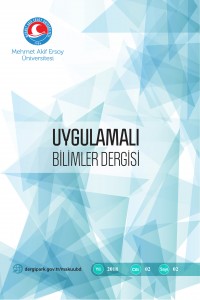Abstract
Türkiye ekonomi modelinin önümüzde yıllarda yapılacak reformlarla ihracat
odaklı büyümeye yakınsayacağı aşikardır. Bu yapılmadığı takdirde cari açığın
yarattığı risklerle dalgalı ekonomi süreci devam edecektir. Çalışmamızın odak
noktası söz konusu planın bir parçası olarak büyüme potansiyeli olan ancak hem
Banka hem de Eximbank’ta limiti dolmuş şirketler için borçlanmadan ve
bankacılığı aradan çıkartarak ihracat finansmanın nasıl sağlanacağı üzerindedir. Ayrıca sukuk
modelinde Türkiye’de sınırlı sayıda ve ortalama 5 yıl vadede olan dolar
sukukları için miktarı önemli oranda artığı gözlemlenmektedir. Bununla birlikte
ürünün banka modelini Ortadoğu’da kullanan yatırımcılar için sukuk modeli ile
menkul kıymetleştirme sağlanmaktadır. Ülkemizde SPK kontrolü altında yapılacak
ihraç, güveni artıracağı gibi menkul kıymetleştirme vade öncesi çıkışı
beraberinde getirecektir. Ürünün alacak sigortalı olması da ikincil piyasada
likiditeyi artıracaktır. Bunun sonucunda geleneksel anlamda Ortadoğu’da ürünü
kullanan yatırımcılar için sukuk modeli daha cazip olacak ve Türkiye’ye körfez
sermayesinin akışını artıracaktır.
Keywords
References
- Abdul Aziz, R., & Gintzburger, A.-S. (2009). Equity-Based, Asset-Based and Asset-Backed Transactional Structures in Shari’a-Compliant Financing: Reflections on the Current Financial Crisis. Economic Papers, 270-278.
- Beck, T., Demirguc-Kunt, A., & Levine, R. (2005). SMEs, Growth and Poverty. Journal of Economic Growth, 199-229.
- Cravoy, T., Gourlayy, A., & Beckery, B. (2012). SMEs and regional economic growth in Brazil. Small Bus Econ, 217-230.
- Gundogdu, A. (2016). Exploring novel Islamic finance methods in support of OIC exports. Journal of Islamic Accounting and Business Research, 78-92.
- Gundogdu, A., & Dogan, E. (2014). Two-step Murabaha in stock exchange as an alternative to commodity Murabaha for liquidity management. International Journal of Financial Services Management, 268-285.
- Iqbal, M., & Llewellyn, D. (2000). Islamic Banking and Finance: New Perspective on Profit Sharing and Risk. Cheltenham: Edward Elgar Publishing, Ltd.
- Iqbal, Z., & Mirakhor, A. (2006). An Introduction to Islamic Finance—Theory and Practice. Hoboken, New Jersey: Wiley Finance Editions, John Wiley & Sons, Inc.
- Iqbal, Z., & Tsubota, H. (2006). Emerging Islamic Capital Markets. Islamic Finance Review, 5-11.
- Rocha, R., Farazi, S., Khouri, D., & Pearce, D. (2011). The Status of Bank Lending to SMEs in the Middle East and North Africa Region. Results of a Joint Survey of the Union of Arab Bank and the World Bank, Policy Research Working Paper 5607.
- Singh, H. (2009). Islamic banks may not be insulated from ‘aftershocks. The Malaysian Reserve, Available at: http://islamicfinanceasia.blogspot.com/2009/03/islamic-banks-may-not-be-insulated-from.
Abstract
References
- Abdul Aziz, R., & Gintzburger, A.-S. (2009). Equity-Based, Asset-Based and Asset-Backed Transactional Structures in Shari’a-Compliant Financing: Reflections on the Current Financial Crisis. Economic Papers, 270-278.
- Beck, T., Demirguc-Kunt, A., & Levine, R. (2005). SMEs, Growth and Poverty. Journal of Economic Growth, 199-229.
- Cravoy, T., Gourlayy, A., & Beckery, B. (2012). SMEs and regional economic growth in Brazil. Small Bus Econ, 217-230.
- Gundogdu, A. (2016). Exploring novel Islamic finance methods in support of OIC exports. Journal of Islamic Accounting and Business Research, 78-92.
- Gundogdu, A., & Dogan, E. (2014). Two-step Murabaha in stock exchange as an alternative to commodity Murabaha for liquidity management. International Journal of Financial Services Management, 268-285.
- Iqbal, M., & Llewellyn, D. (2000). Islamic Banking and Finance: New Perspective on Profit Sharing and Risk. Cheltenham: Edward Elgar Publishing, Ltd.
- Iqbal, Z., & Mirakhor, A. (2006). An Introduction to Islamic Finance—Theory and Practice. Hoboken, New Jersey: Wiley Finance Editions, John Wiley & Sons, Inc.
- Iqbal, Z., & Tsubota, H. (2006). Emerging Islamic Capital Markets. Islamic Finance Review, 5-11.
- Rocha, R., Farazi, S., Khouri, D., & Pearce, D. (2011). The Status of Bank Lending to SMEs in the Middle East and North Africa Region. Results of a Joint Survey of the Union of Arab Bank and the World Bank, Policy Research Working Paper 5607.
- Singh, H. (2009). Islamic banks may not be insulated from ‘aftershocks. The Malaysian Reserve, Available at: http://islamicfinanceasia.blogspot.com/2009/03/islamic-banks-may-not-be-insulated-from.
Details
| Primary Language | Turkish |
|---|---|
| Journal Section | Articles |
| Authors | |
| Publication Date | September 30, 2018 |
| Acceptance Date | September 17, 2018 |
| Published in Issue | Year 2018 Volume: 2 Issue: 2 |


